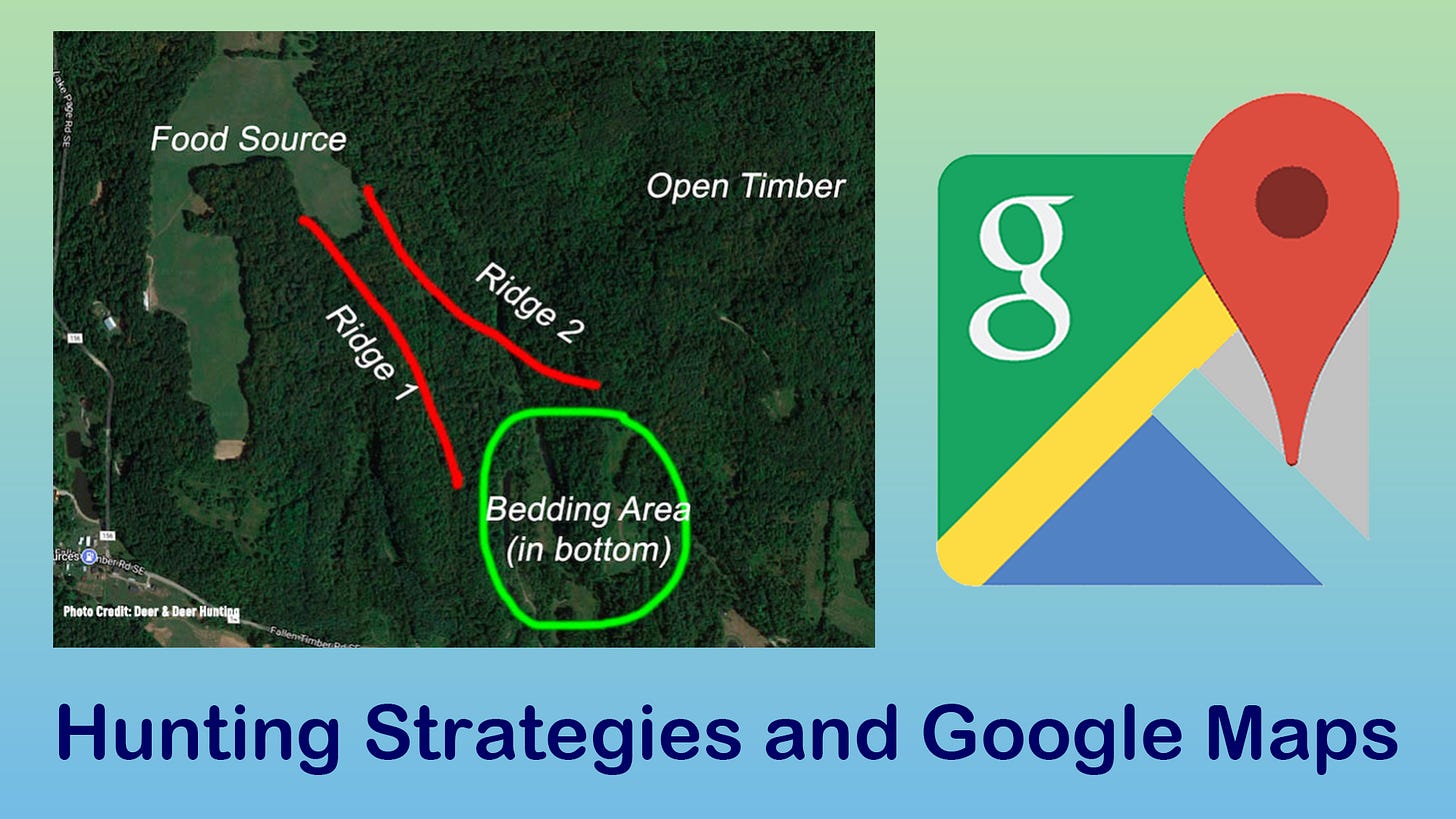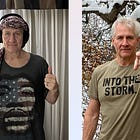Hunting Strategies Using Google Maps
I have made no secret about my love of hunting and its applications to daily living, basic survival, and I could make a strong argument that a “hunting frame of mind” can help lead to success. I also believe having a thorough knowledge of hunting tips, tricks and strategies can result in those people who put the time and effort into both having a much greater appreciation for Mother Nature and the intricate weave of interdependencies among living creatures in the world we all share together.
I believe that learning how to hunt can lead to the following benefits for those people willing to put the time in to be a successful hunter. These benefits include:
Develops observational skills and techniques.
Develops problem solving skills.
Develops basic survival skills.
Provides for more appreciation of Mother Nature.
Provides a better understanding of the interconnectedness of the world.
Provides skills and knowledge that can be used in the woods, in rural areas, and in urban areas….whether in a natural setting or on the battlefield.
Provide opportunity for year-round training for the Mind, Body, and Spirit.
I cannot exactly say when I officially started hunting either with my father or on my own…I believe I was around 7 or 8 years old at the time learning about rabbit hunting with guns and snares. I can say without question that I learned how to shoot a gun before I learned how to ride a bicycle. This was in part due to both of my parents being soldiers and my general interest in immersing myself in nature.
Over the years I have done my best to help introduce and help educate people on all of the aspects and benefits of hunting and also to try to counter the belief that all hunting involves is simply walking in the woods with a weapon and killing something. This is the furthest thing from the truth for anyone who would call themselves a hunter. Someday I may write an article on some of the other aspects of hunting, however, for this article I wanted to highlight some hunting strategies.
I also want to clearly state that I am in no way providing this information to encourage any illegal activities and when I say to go “hunting” I am not referring to killing creatures of any kind…human or otherwise. When I use the term “hunting”, I am referring to a mindset and various tips, techniques, and strategies that can be applied to daily living…and most certainly does not result in anything getting killed…unless you are actually hunting in that mode of operation…as is traditionally seen with deer hunting or other wild game.
In the context this article, “hunting game” could be anything you are strategizing and coming up with a plan in order to have a successful hunt…even if that means coming up with a plan to stop at the most number of garage sales searching for specific items. Yes, Virginia, that is an example of the hunting mindset and no one had to shoot a gun, and nothing was killed…except maybe your hope for finding that one special thing that you have been “hunting” for all that time.
But seriously, the hunting mindset is much more than about using a weapon to kill something….it is truly a way of living that embraces natural observations, planning and logistics, training and practice.
I will be completely transparent that I decided to write this article due to the fact that now is pre-scouting season (i.e. get out in the woods and start learning the lay of the land), all of the protests happening around the world, and the ongoing and criminal war being waged against Ukraine. I thought that sharing some of this information could be useful on several fronts if for nothing else other than introducing other people to the hunting mindset…whether you are hunting animals, people, good locations, etc…and some tools and concepts that could be useful in a rural or urban setting and whether or not you are hunting as an individual, group, or soldier. I believe anyone, especially new recruits, would benefit from understanding some pieces of a hunting mindset…in order to encourage more research for professional and personal development.
I am providing the links and videos below as a starting point to consider keeping a hunting mindset while carrying out your day-to-day activities…as I have been doing almost my entire life.
There are a few terms that are commonly used when pre-scouting for whatever you are planning to observe before engaging in any time of hunt. Besides the obvious one of identifying where game carries out basic survival activities like eating, drinking, and obtaining shelter. Those are usually the easy ones that most people think of right away. However, there are also important terms that describe specific types of environments and situations that can lead to a more successful hunt.
These terms describe specific types of areas that can be identified in a variety of ways and can substantially increase success rate when properly utilized as part of an overall strategies which include:
Funnels
Pinch Points
Saddles
While in the traditional sense of the word, the terminology above is general thought of as looking over a wooded areas, however, if for whatever reason the particular hunt or mission involved an urban setting for example, looking at security points for strengths and opportunities around a particular building, complex, or encampment…the same basic principles apply. This is not that complicated to understand and easy to implement once you have obtained a hunting mindset which comes through Hard work, Dedication, Training, and Education.
Here are some useful articles that give a nice overview of those hunting terms and others, as well as other useful hunting strategies.
Hunting Funnels During The Rut, by Gearld Almy
Understanding “Pinch Points” and Using Them in Hunting Situations, by Brian E. Halchak, November 11, 2020
How To Create a Deer Funnel, by Hampton Bourne, October 21, 2024
One tool that hunters have access to today that can greatly facilitate understanding both the “lay of the land” as well as the movement and habits and behaviors of wild game include Google Maps and Google Earth. Other related tools are various A Geographic Information System (GIS) and online maps available from many of U.S. states Department of Environmental Conservation or similar related agencies.
Because people have different learning styles, here are a few videos that discuss how to use these tools as part of an overall hunting strategy.
How to Use Google Maps for scouting and hunting (9:43)
How to use Google Maps on Hiking Trails Even Without Cell Service (4:13)
Use Google Earth to Log All your Hunting Data and Start Shooting More Whitetail Deer (8:31)
Using Google Earth For Deer Hunting (16:58)
How to use Google Earth for E-Scouting (14:43)
How to Evade A Professional Military (Tracking, Countertracking) (57:02)
10 Military Stealth Survival Skills! (14:50)
Here are some other articles that incorporate other hunting strategies as well. As always, be safe and most importantly…have fun out there!












